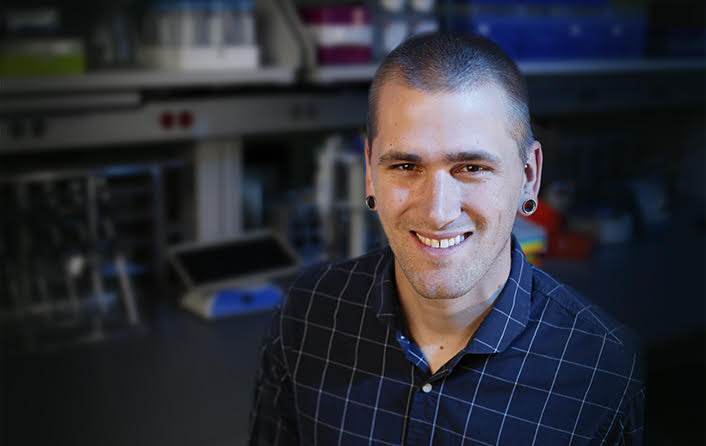
-
- Posted Wednesday March 3, 2021
Men, older adults and smokers are more prone to infection by SARS-CoV-2
Study provides answers to who and why COVID-19 poses increased risk and potential death among certain demographics
PHOENIX, Ariz. — March 3, 2021 — An in-depth analysis of the virus that causes COVID-19 by an international team of scientists — including the Translational Genomics Research Institute (TGen), an affiliate of City of Hope, — suggests that men, older adults and smokers exhibit certain genomic traits in their airways that make it easier for them to contract the disease.
The findings were published this week in Nature Medicine.
Data from single-cell RNA genomic sequencing and the Human Cell Atlas — a collection of comprehensive reference maps that describe and define the cellular basis of health and disease — allowed the researchers to analyze the effect of the SARS-CoV-2 virus on more than 1.3 million cells from nasal, airway and lung tissue samples from 228 healthy individuals without COVID-19.
“We looked at entry factors across numerous organs and cell types that are commonly infected by the COVID-19 virus, and we found that age, smoking and sex all played significant roles in the ability of SARS-CoV-2 to enter cells, replicate and further infect other cells,” said Dr. Nicholas Banovich, a TGen Associate Professor and member of the Lung Biological Network of the Human Cell Atlas.
This research builds on two previous studies involving TGen researchers that showed how goblet cells — which produce mucus in nasal passages — overly express angiotensin-converting enzyme 2 (ACE2), which serves as the entry point into the body’s cells for coronaviruses.
The new study focused on the effect of SARS-CoV-2 on three key airway cells known as: alveolar type 1, essential for inhaling oxygen and exhaling carbon-dioxide; alveolar type 2, which defend the type 1 cells; and airway epithelial cells, which remove and neutralize potentially harmful substances from inhaled air.
Among men, older adults and those who smoked, the study found that the ACE2 enzyme was more highly expressed, meaning it was easier for the coronavirus to enter and infect these cells.
Men and older adults also expressed more TMPRSS2, a gene that cuts open the Spike proteins on the surface of the virus, aiding its entry into human cells. Researchers also found additional enzymes beyond TMPRSS2 that also enable the virus to infect the body.
“In addition to co-morbidities, such as high-blood-pressure and diabetes, this research helps explain the biology behind why older adults and smokers may be at higher risk for COVID-19 infection and should be prioritized for vaccination,” Dr. Banovich said.
Other TGen researchers who worked on this study were Dr. Linh Bui, a post-doctoral fellow, and bioinformatician Austin Gutierrez.
Corresponding authors of the study are: Christoph Muus at the Massachusetts Institute of Technology and Harvard University; and Malte Luecken at the German Research Center for Environmental Health.
In all, more than 180 institutions worldwide contributed to this report — Single-cell meta-analysis of SARS-CoV-2 entry genes across tissues and demographics — which was published March 2 in Nature Medicine.
# # #
About TGen, an affiliate of City of Hope
Translational Genomics Research Institute (TGen) is a Phoenix, Arizona-based nonprofit organization dedicated to conducting groundbreaking research with life-changing results. TGen is affiliated with City of Hope, a world-renowned independent research and treatment center for cancer, diabetes and other life-threatening diseases: CityofHope.org. This precision medicine affiliation enables both institutes to complement each other in research and patient care, with City of Hope providing a significant clinical setting to advance scientific discoveries made by TGen. TGen is focused on helping patients with neurological disorders, cancer, diabetes and infectious diseases through cutting-edge translational research (the process of rapidly moving research toward patient benefit). TGen physicians and scientists work to unravel the genetic components of both common and complex rare diseases in adults and children. Working with collaborators in the scientific and medical communities worldwide, TGen makes a substantial contribution to help our patients through efficiency and effectiveness of the translational process. For more information, visit: tgen.org. Follow TGen on Facebook, LinkedIn and Twitter @TGen.
Media Contact:
Steve Yozwiak
TGen Senior Science Writer
602-343-8704
[email protected]


